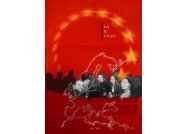turkish-greek civic dialogue - AEGEE Europe
turkish-greek civic dialogue - AEGEE Europe
turkish-greek civic dialogue - AEGEE Europe
Create successful ePaper yourself
Turn your PDF publications into a flip-book with our unique Google optimized e-Paper software.
effort, we still see a decrease in the populations of the cities mentioned above.<br />
This population chart is important as it shows that we have control over the<br />
population because we draw this chart by looking at this population figures.<br />
Looking into the details, we obtain data on the number of enval-i metruke<br />
in Ankara. A source like this is a precious one for Turkey regarding not only<br />
the exchange process but also the architecture history, city history and the<br />
initiation of modern city planning discipline through designing the cities ruined<br />
by fires and wars.<br />
Everything, whether movable or immovable, mankind takes pains to realize<br />
must be regarded as cultural property. So, a well-made wall, a well-placed<br />
stained glass or a well-paved road may not be regarded as cultural property<br />
according to today’s descriptions of concepts. However, they should be regarded<br />
as so where the quality of work is appreciated. This study of mine is surely an<br />
accountancy study but as I stated, we should be aware of our hens.<br />
CHRISTIAN REFUGEES & MINORITY MUSLIMS IN GREECE:<br />
THE QUESTION OF<br />
NATIONAL HOMOGENISATION<br />
AND THE ROLE OF EDUCATION<br />
............................................................................................. Giorgos Mavrommatis<br />
Istanbul 8/11/03<br />
I want to first clarify two observations about definitions and significances.<br />
First it is about with the terms muhacir and mubadil.<br />
All people in Greece, when they refer to the persons that came in the country<br />
from the Eastern Thrace and the Asia Minor, use the term “refugees”. In<br />
Turkey, they use the term “exchanged”. Two different teams, parallel policies<br />
implemented, military and legal processes, experience their exit from the<br />
patrimonial grounds - and their later attribute based on this exit - with<br />
different ways, and they are finally named with different terms, that are of<br />
Association des Etats Généraux des Etudiants de L’<strong>Europe</strong><br />
course also connected with different meanings. I believe that they rather are<br />
the terms of the exit, the different for each team conditions in which the<br />
process was carried out. Perhaps, some of them are contemporaneous or even<br />
posterior with the exit ideological and political choices that led to the use of<br />
this different terminology.<br />
My second observation is related with the terms “Christian refugees and<br />
minority Muslims” that I use in the title. The bigger part of refugees, and<br />
mainly those who come from the hinterland, they did not have a complete,<br />
Greek national conscience at their arrival in Greece in 1923. Besides that, they<br />
were compelled to abandon their homelands in the framework of exchange<br />
of populations; it was those who depended on the jurisdiction of the Greek<br />
Orthodox Patriarchate of Istanbul.<br />
Concerning the Muslims of Thrace, the research has proved clearly that, during<br />
the decade of 1920, only very few people had a Turkish national conscience,<br />
while about the question of the national conscience of the whole minority<br />
intense discussions and contradictions continue existing. That’s how I selected<br />
to use the terms “Christian refugees and minority Muslims”.<br />
In 19th and in the beginning of 20th century, the predominance of ideology<br />
of nationalism in the Balkans resulted from the collapse of big empires and<br />
the creation of the national states through wars. The aim of the cultural<br />
homogeneity led Greece and Turkey in the obligatory exchange of populations<br />
between them, with the exclusive criterion of the religious faith. This exchange,<br />
however, did not ensure obligatorily the desirable cultural homogeneity.<br />
Regarding the Christian refugees, the place and the Greek culture was,<br />
generally, unknown. Very few of them had contacts with the newly established<br />
Greek state. Their basic means of integration in the Greek society was their<br />
integration in the productive process. Much later they began to develop<br />
narrower relations with the local population, while their direct attendance in<br />
the political system and the common religion contributed in their integration.<br />
For some of the refugee children, the situation was relatively easy. Their origin<br />
from urban families with high income and education and their mother tongue<br />
Greek created important conditions for success. The rest of the children faced<br />
important difficulties, while it seems that children of Turkish-speaking farmers<br />
faced the bigger problems.<br />
Population Exchange<br />
149







